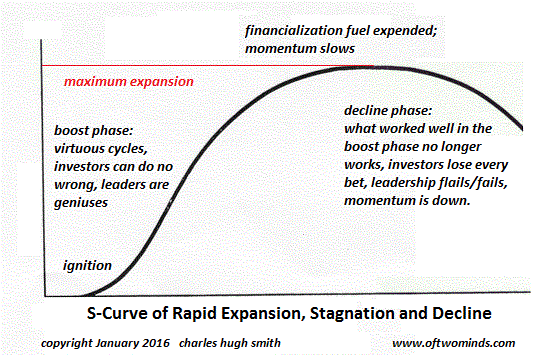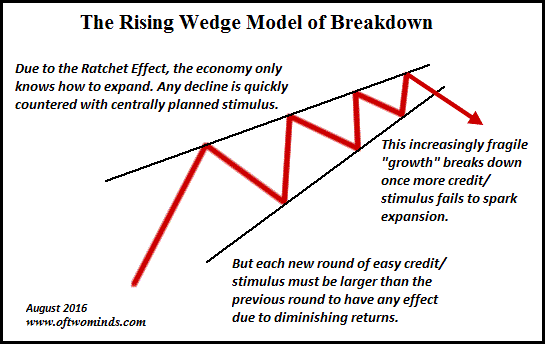July 4th is an appropriate day to borrow Winston Churchill’s the gathering storm to describe the existential crisis that will envelope America within the next decade. There is no single cause of the gathering storm; in complex systems, dynamics feed back into one another, and the sum of destabilizing disorder is greater than a simple sum of its parts.
Causal factors can be roughly broken into two categories: systemic and social/economic. The central illusion of those who focus solely on social, political and economic issues as the sources of destabilization is that tweaking the parameters of the status quo is all that’s needed to right the ship: if only Trump were impeached, if only GDP hits 4% annual growth rate, if only the Federal Reserve started controlling the price of bat guano, etc., etc., etc.
The unwelcome reality is the systemic issues cannot be reversed with policy tweaks or shuffling those at the top of a crumbling centralized order. The systemic problems arise from the structures of centralization and monopoly capital, the institutionalization of perverse incentives and the depletion of natural capital: soil, water, fossil fuels, etc.
We can create “money” out of thin air but we can’t print fresh water, productive soil or affordable energy out of thin air.
Regardless of their ideological labels, centralized socio-economic systems follow an S-Curve of rapid expansion during a “boost phase,” a period of stable expansion (maturity) and then a period of stagnation and decline as the system’s participants do more of what’s failed, as they cannot accept that what worked so well in the past no longer works.
| A successful model traps those within it; escape becomes impossible. That’s the lesson of the S-Curve: |
S-Curve Expansion, Stagnation and Decline - Click to enlarge |
| The Ratchet Effect is another key reason why meaningful reform of the status quo is impossible. In flush times, budgets expand as easily as waistlines, ratcheting up to consume ever-higher revenues. But once revenues start declining, the administrative/consumerist status quo is fiercely resistant to any reduction.
Like a body which has grown fat from excessive consumption and a decline in vitality/ functionality, the status quo resists any reduction in staffing or spending, sacrificing muscle to keep its layers of fat untouched. |
Ratchet Effect - Click to enlarge |
|
In other words, the social crises, the constitutional crises, the financial crises–all of these are to some degree mere manifestations of the failure of centralized systems that arose to benefit from conditions that no longer exist.
Our centralized institutions and systems are failing, and shuffling the management and tweaking the parameters cannot stave off collapse.
What nobody gorging at the trough of the status quo dares admit is the system is failing most of its participants, and this is the source of populism and other manifestations of social disorder. I often publish this chart, as it crystallizes and encapsulates the verboten reality of 21st century America: the few are skimming the vast majority of the rewards of the system, at the expense of the many.
|
Fruit of Financialization - Click to enlarge |
The many are politically powerless and divested of capital. Our centralized system concentrates wealth and power into the very apex of the wealth-power pyramid. In this apex, wealth, power, and control of media and surveillance all mix easily: thus Bezos controls Amazon and The Washington Post and has long-established ties to the National Security State in what’s been aptly described as Surveillance Capitalism, a term that also describes Facebook and other quasi-monopolies of social media.
Rather than admit the failure of our socio-economic system, those benefiting from the system’s gross imbalances are pursuing a multi-pronged strategy of control:
1. Propaganda. The basic idea here is simple: ignore what your own experience is telling you about the failure of our socio-economic system and believe a carefully tailored host of interconnected narratives that all is well and this is most prosperous, wonderful system in the galaxy, nay, the universe.
Anyone who challenges these narratives is quickly attacked and marginalized:a highly centralized state goes hand in hand with a highly centralized media. Anything outside this apex of wealth and power is dismissed as “fake news.”
For example, anyone who dares measure real-world inflation is quickly attacked and marginalized, least the restive masses finally awaken to the reality that the unprotected are being ravaged by 6% to 8% annual inflation in big-ticket items while the protected elites bask in subsidies that protect their self-serving fiefdoms from the harsh reality of rising inflation (i.e. loss of purchasing power).
2. Bribery and buy-offs such as debt forgiveness, tax breaks and Universal Basic Income (UBI). To calm the restive masses who have been disenfranchized, exploited and transformed into tax donkeys, those in the apex of power offer bribes and buy-offs: hey, let’s “forgive” student loan debt–but of course it’s not actually forgiven; the losses are simply transferred to the taxpayers.
Tax breaks and subsidies are used to mask the ever-greater share of the nation’s wealth being skimmed by junk fees, useless licencing, compliance penalties, and taxes on everything.
Universal Basic Income (UBI) is the ultimate systemic bribe. Having stripmined the unprotected non-elites of opportunity and capital, those at the top of the wealth-power pyramid are promoting basic material survival as the substitute for actually having a stake in the system.
The unspoken reality is that UBI is designed to give debt-serfs just enough income to keep servicing their debts. Why not bypass the charade of “helping the powerless” and transfer the taxpayers’ money directly to the banking sector?
The gathering storm cannot be dissipated with propaganda and bribes. The status quo is only hastening its demise with its strategy of misdirection and distraction.My new book Money and Work Unchained is $9.95 for the Kindle ebook and $20 for the print edition.
My new book is The Adventures of the Consulting Philosopher: The Disappearance of Drake. For more, please visit the
book's website.
Full story here
Are you the author?
At readers' request, I've prepared a biography. I am not confident this is the right length or has the desired information; the whole project veers uncomfortably close to PR. On the other hand, who wants to read a boring bio? I am reminded of the "Peanuts" comic character Lucy, who once issued this terse biographical summary: "A man was born, he lived, he died." All undoubtedly true, but somewhat lacking in narrative.
Previous post
See more for 5.) Charles Hugh Smith
Next post
Tags:
newslettersent











































